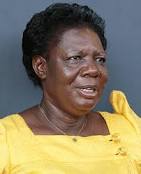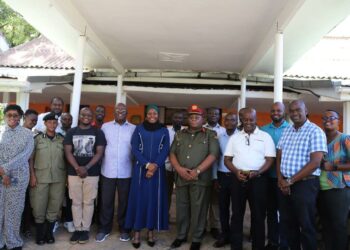Jinja, Uganda – Busoga’s reputation is under strain, battered by soaring teenage pregnancy rates that threaten the region’s social and economic fabric. Senior Presidential Advisor (SPA) for Poverty Alleviation, Hon. Florence Mutyabule, is sounding a clarion call to action. Alarmed by the surge in school dropouts, entrenched poverty, and social stigma, the former Namutumba MP (2011-2016) and veteran educator is urging parents, faith-based institutions, and the Busoga Kingdom to intensify efforts to educate communities about the dangers of adolescent pregnancy.
“We must reignite our resolve and unite to tackle this crisis, which is fast becoming an embarrassment, leading others to question our seriousness as a region,” Mutyabule declared at a recent gathering in Jinja. Her plea targets parents, particularly to guide their daughters on reproductive health, while also emphasizing the critical need to engage boys, who often escape accountability for their role in these pregnancies.
Mutyabule highlighted a stark injustice: pregnant girls face expulsion from school, stigma, and lifelong hardship, while boys frequently continue their education uninterrupted, sometimes even transferring to new schools. “This disparity fuels inequality and impunity. We must confront it head-on,” she insisted, calling for a cultural shift to hold all parties accountable.
Quoting Prof. Frederick Edward Makumbi from Makerere University’s School of Public Health, Mutyabule underscored the stakes: “Any reduction in adolescent pregnancy means fewer girls will endure the harsh social and health consequences of early childbearing.” She added, “We’re tired of reports that merely spotlight our failures. It’s time for action, not resolutions that gather dust.”
The urgency is undeniable. The Uganda Annual Health Sector Performance Report 2023/24 identifies teenage pregnancy as the leading cause of death for girls aged 15-19, with Busoga bearing a disproportionate burden—some as young as 13 are becoming mothers. Nationally, 24% of girls aged 15-19 are pregnant or have given birth, the highest rate in the East African Community. Rural areas, at 25%, outpace urban zones at 21%, and teenage girls contribute to 17.2% of Uganda’s maternal mortality rate of 336 deaths per 100,000 live births. In Busoga, the crisis is acute, with 28.4% of girls aged 15-19 affected, leading to widespread school dropouts and deepened poverty cycles.
The World Health Organization defines teenage pregnancy as occurring in females under 20, typically ages 13-19, and notes its severe health, social, and economic toll in low-income countries like Uganda, where approximately 350,000 cases occur annually. Experts frame it as more than a health issue—it’s a development crisis, a gender equality barrier, and a thief of potential for both girls and society.
Busoga Kingdom’s Bold Response
The Busoga Kingdom, led by His Royal Highness William Wilberforce Gabula Nadiope IV, the Kyabazinga, is spearheading a dynamic response, now bolstered by Mutyabule’s advocacy. Appointed UNAIDS Goodwill Ambassador in 2024 and UNFPA Goodwill Ambassador in 2025, the Kyabazinga is tackling root causes: poverty, parental disengagement, peer pressure, unchecked internet influence, and limited access to reproductive health services.
A cornerstone initiative is “Abasaadha Ne’Mpango” (Men Are the Pillars), a community-driven campaign backed by UNICEF and MTN Uganda. Launched to engage men and boys, it promotes responsible parenting and gender equity, training community “pillars” to monitor progress from Bugembe to rural villages. In July 2025, MTN Uganda amplified the campaign with youth empowerment programs blending education and sports.
The MTN Busoga Masaza Cup, a vibrant sports tournament, doubles as a platform for peer educators to discuss healthy choices, while the Busoga Bicycle Races weave awareness into community events. In May 2025, the Kyabazinga hosted UNICEF’s country representative to strategize on reducing child marriages and dropouts. By September, dialogues at Wanyange Girls’ School with UNFPA highlighted stories like that of Jannat Namulinda, a teenage mother now rebuilding her life through kingdom-sponsored tailoring training.
These efforts align with partnerships involving 11 UN agencies, including WHO and the World Bank, with funding from Sweden to address Busoga’s broader health challenges, such as sickle cell disease, jiggers, and malnutrition. A June 2025 Makerere survey revealed 16.1% of adolescent girls in Busoga and Bukedi are currently pregnant, with 43% sexually active, underscoring the crisis’s scale.
A National Challenge
Busoga is not alone. Eastern regions like Bukedi, Bugisu (38,790 cases), and Teso (43,099 cases), alongside Karamoja, Tooro, and Lango, face similar hurdles: limited reproductive health access, poverty, and lax parental oversight. Nationally, Uganda grapples with high adolescent pregnancy rates, driven by cultural norms and systemic gaps.
Mutyabule’s call to empower girls as “mothers of the nation,” combined with the Kyabazinga’s royal leadership, marks a turning point. From community campaigns to royal-backed interventions, Busoga’s fight against teenage pregnancy is gaining momentum. If sustained, this unified effort could transform the region, unlocking the potential of its girls one empowered step at a time.
Do you have a story in your community or an opinion to share with us: Email us at editorial@watchdoguganda.com














